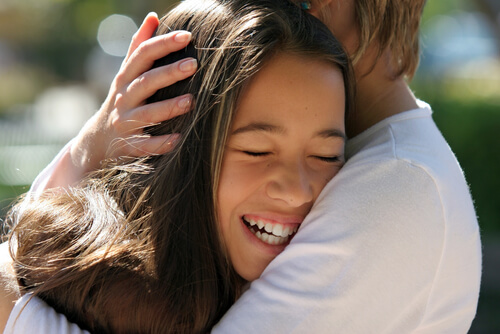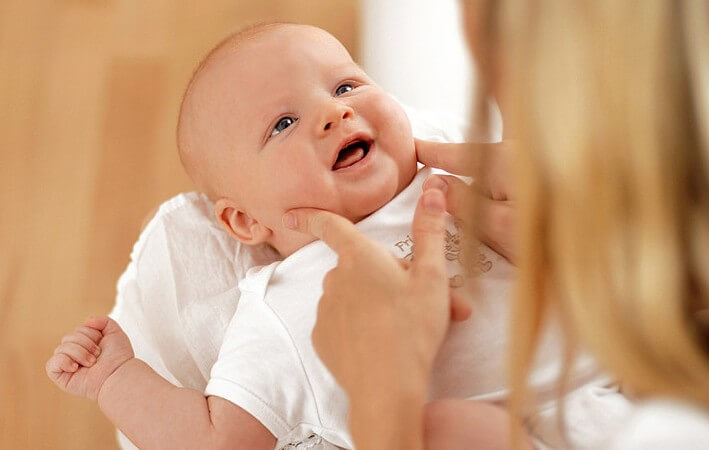8 Therapeutic Benefits of Caressing Your Child

The therapeutic benefits of caressing your child are innumerable. Showing them physical affection is something that comes naturally to parents, especially when they’re small.
It’s natural for parents and family members to want to give affection to children, as well as protect and embrace them.
It’s important to provide physical contact to children, either by holding their hands, caressing them or giving them hugs and kisses. These displays of affection benefit parents and children alike, and strengthen their relationship.
When children get older, it’s easy to forget the importance and necessity of these gestures, even though older children still need contact. Keep in mind that even when they seem to reject it, they do appreciate it.
They may just prefer it in a different way – a way that is less childish or less obvious – such as in private and not in front of their peers.
Caresses can be used to comfort, to provide simple and loving support, or to express affection for a loved one. This physical and emotional experience is appreciated by all. In addition, the slower the caresses, the more intensely the brain reacts.
8 Therapeutic benefits of caressing your child
Below we’ll point out eight therapeutic benefits of caressing your child:
1. Creates a connection between parents and their children
Caresses clearly strengthen the parent-child bond and allow us to connect with our little ones through the body and soul.
Likewise, signs of affection work to strengthen our relationships and show your child the love you feel for them without ever needing to speak a word.

2. Learning to give and receive affection
For a child to be affectionate, he must first receive affection. In this sense, it’s very important that you teach him its importance from a very young age, since it influences his ability to relate to others.
3. Improves communication in children
Through contact, you can communicate with your child, reassure him and show him that you love him. You must give him affection from his very first days of life.
Caresses will help him wake up and will have an impact on his future life. In fact, babies who are caressed often find it easier to open up to others and are more likely to have the ability to comfort other people.
4. Strengthens confidence
Children receive self-esteem and support through caresses. As a result, he feels valued and recognized by others.
A caress brings a feeling of company and closeness. It’s a gesture that transmits protection and strength, reducing emotional pain. Caresses foster trust and show that there isn’t only affection, but a sense of surrender.
Love is for a child like the sun is for the flowers: he may have enough bread, but he needs caresses to be good and to be strong.
–Concepción Arenal–
5. Reduces stress
It’s proven that children who receive affection are less stressed. Caresses calm children of any age and at any time.
Proof of this is that neonates develop at a higher rate and are less stressed when they receive caresses, compared to those who don’t receive them as often.
6. Positive feelings
A child who is loved and receives affection will be an affectionate adult capable of expressing positive feelings to his parents and those around him.
Signs of affection, like caresses, generate positive effects on a series of behaviors and psychological states throughout life. In addition, they allow the child to feel pleasure and build a sense of self-esteem.

7. Generates oxytocin
Oxytocin is a hormone that has the ability to act on the brain and muscles. When secreted in large quantities, it promotes relaxation of the body and feelings of appeasement, well-being, and social and emotional comfort.
Its secretion increases in little ones during any manifestation of physical tenderness, either through caresses, massages or hugs. In this sense, caresses favor the production of oxytocin, creating a sense of well-being and tranquility in children.
8. Improves sleep
Hugging, caressing and kissing help children sleep much better. It’s proven that little ones who receive caresses rest better at night. You can use caresses when your child can’t sleep, as they provide relaxation, end headaches and help fight nervous tension.
As you’ve seen, the therapeutic benefits of caressing your child are numerous. Through caresses, you provide your little one with something essential for his healthy physical and emotional development: human physical contact.
When necessary affection and caresses aren’t received, specialists agree that personality problems may arise in the future.
All cited sources were thoroughly reviewed by our team to ensure their quality, reliability, currency, and validity. The bibliography of this article was considered reliable and of academic or scientific accuracy.
- Gentsch, A., Panagiotopoulou, E., & Fotopoulou, A. (2015). Active interpersonal touch gives rise to the social softness illusion. Current Biology, 25(18), 2392-2397. https://www.sciencedirect.com/science/article/pii/S0960982215008830
- Gallace, A., & Spence, C. (2010). The science of interpersonal touch: an overview. Neuroscience & Biobehavioral Reviews, 34(2), 246-259. https://www.sciencedirect.com/science/article/abs/pii/S0149763408001723
This text is provided for informational purposes only and does not replace consultation with a professional. If in doubt, consult your specialist.








